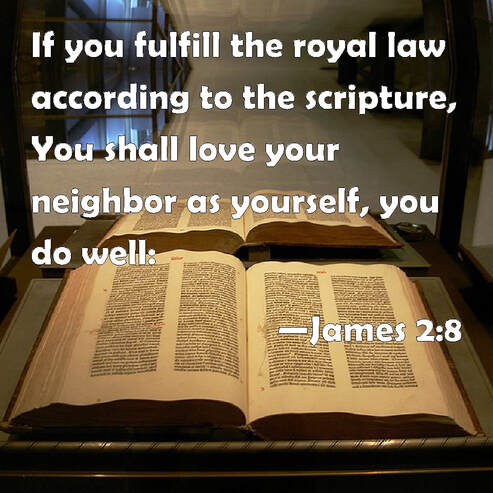James 2:1-13
Lesson 439
Read both the "King James Bible" and the "New Living Translation."
In this lesson:
No favorites.
Look for the allegation in verse 2:4.
We are saved, not by our good works but by our faith.
The product of that faith is a changed life and the good works that follow.
What is -
The Royal Law (2:8) -
The Royal Law, sometimes called the Sovereign Law, is brotherly love. It is a more positive aspect of the Mosaic Law. While the Mosaic Law tells us not to kill, the Royal Law teaches us to love each other. While the Mosaic Law tells us not to steal, the Royal Law asks us to give to others. Not hating your neighbor isn't enough. The Royal law instructs us to love them. The Royal Law was first announced by Jesus in John 13:34 and reinforced in John 15:12 and Matthew 22:37-40. Paul repeated It in Romans 13:8 and Galatians 5:14. All the commandments depend on love (Romans 13:10). We are all learning together, so I would like to know your thoughts on the Royal Law.
The Royal Law (2:8) -
The Royal Law, sometimes called the Sovereign Law, is brotherly love. It is a more positive aspect of the Mosaic Law. While the Mosaic Law tells us not to kill, the Royal Law teaches us to love each other. While the Mosaic Law tells us not to steal, the Royal Law asks us to give to others. Not hating your neighbor isn't enough. The Royal law instructs us to love them. The Royal Law was first announced by Jesus in John 13:34 and reinforced in John 15:12 and Matthew 22:37-40. Paul repeated It in Romans 13:8 and Galatians 5:14. All the commandments depend on love (Romans 13:10). We are all learning together, so I would like to know your thoughts on the Royal Law.
Study Tip:
"Read the Bible with an open mind. Don't read into its passage's ideas that are not there. Try to search out fairly and honestly the main teachings and lessons of each passage."
Henry Hampton Halley, minister, and religious writer (1874-1965).
"Read the Bible with an open mind. Don't read into its passage's ideas that are not there. Try to search out fairly and honestly the main teachings and lessons of each passage."
Henry Hampton Halley, minister, and religious writer (1874-1965).











